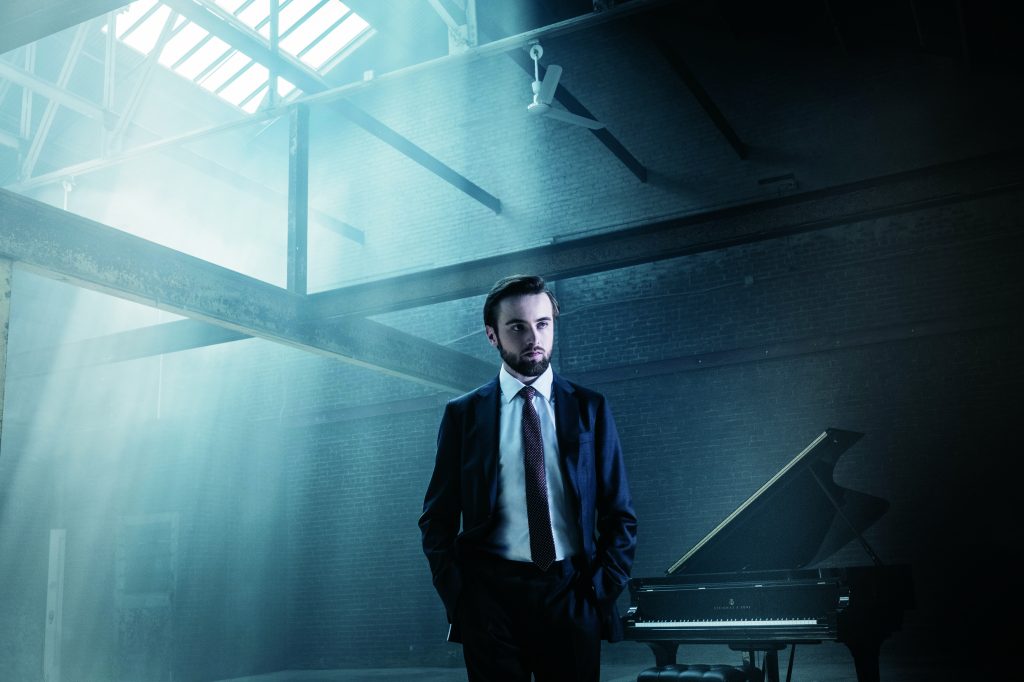Trifonov Triumphs at The Conrad
If you have had the good fortune to experience a live performance by Daniil Trifonov, you probably don’t need to read any further. Because you know this review of his recent La Jolla recital will be a nonstop paean of lavish, deserved praise of a musician who at age 28 has earned the title of “the most astounding pianist of our age.”

Daniil Trifonov [photo (c.) Dario Acosta
For the heart-on-the-sleeve romantics, he ripped through Schumann’s wild pianistic mood swings of Bunte Blätter, Op. 99, a seldom-performed catalogue of 14 short, unrelated movements the composer compiled towards the end of his career. And for the adventurous, Trifonov presented a gripping account of Prokofiev’s Sonata No. 8 in B-flat Major, a tumultuous work the composer wrote during the uncertainties World War II, only to have this brave piece officially banned in 1948 by the Soviet Politburo as a prime example of “cacophonous formalism.”
I found Trifonov’s electric Beethoven E-flat Sonata unusually compelling. Although sheer velocity is not a huge virtue in my book, I was impressed by the astonishing speed at which he played the second and fourth movements—the Allegro Vivace and the Presto con fuoco—keeping every note precisely in place while providing ample interpretive nuance and bold dynamic contrasts. His relaxed confidence in the Menuetto provided welcome contrast to the exhilarating other three movements, but he maintained his unmistakable drive and laser-focused intention just below the Menuetto’s serene surface.
It may be a cliché, but Russian pianists get Prokofiev. I recall Yefim Bronfman’s slashing interpretive depth playing two Prokofiev Sonatas—No. 4 and No. 6—on a single SummerFest program in 2014, and on Tuesday, Trifonov brought equal élan and insight to his Sonata No. 8. The composer lays all of his cards on the table in the vast first movement, both longer and more probing than the remainder of his sonata. If the movement’s opening suggests the air of improvisation, Trifonov charged the angular, restless themes in the bass range with a sense of foreboding that soon exploded through Prokofiev’s disarming maze of moto perpetuo accompaniment into the turbulent fortissimo heart of the movement. Trifonov bounced on the bench as he pummeled the Steinway into submission, filling Baker-Baum with dark, resplendent clangor. The composer may have marked this section “inquieto,” but Trifonov let us know that it was the composer’s soul that was anxious—his music only magnified this state to cosmic proportion.
Trifonov floated through the middle movement—the composer wanted it to be dreamlike—an uncomplicated neoclassical instrumental aria that hearkened back to an earlier stage of Prokofiev’s stylistic development. If the final movement brought back the spirit and even a few of the themes of the first movement, Trifonov’s dramatic attacks and commanding orchestral breadth kept us on the edge of our seats awaiting the wild, careening finale that brought the cheering audience to their feet.
An avid Schumann fan, I rarely hear enough of his piano music, but after the 14 sections of “Bunte Blätter” and the obscure “Presto passionato,” I was ready to wave the white flag. Trifonov honored the gamut of emotional states depicted in these disparate fragments with elegantly detailed and even ardent accounts of inspirations for which the composer never found larger, more integrated musical contexts. Perhaps it was a case of too much of a good thing.
Trifonov played two encores by Sergei Rachmaninoff: a transcription of the beloved “Vocalise” and “Silver Bells.”
This recital was presented by the La Jolla Music Society in the Conrad Prebys Performing Arts Center’s Baker-Baum Concert Hall on April 17, 2019. The organization’s Coming Home Festival continues through May 19, 2019.

Ken Herman, a classically trained pianist and organist, has covered music for the San Diego Union, the Los Angeles Times’ San Diego Edition, and for sandiego.com. He has won numerous awards, including first place for Live Performance and Opera Reviews in the 2017, the 2018, and the 2019 Excellence in Journalism Awards competition held by the San Diego Press Club. A Chicago native, he came to San Diego to pursue a graduate degree and stayed.Read more…
